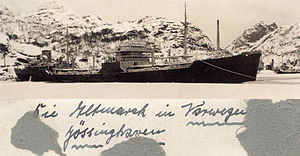German tanker Altmark

Altmark in early 1940, Jøssingfjord, Norway
|
|
| History | |
|---|---|
|
|
|
| Name: | Altmark |
| Namesake: | Altmark |
| Builder: | Howaldtswerke, Kiel |
| Laid down: | 15 June 1936 |
| Launched: | 13 November 1937 |
| Commissioned: | 14 August 1939 |
| Renamed: | Uckermark, 6 August 1940 |
| Fate: | Destroyed by accidental explosion, 30 November 1942 |
| General characteristics | |
| Displacement: | 20,858 t (20,529 long tons) full load |
| Length: | |
| Beam: | 22 m (72 ft 2 in) |
| Draught: | 9.3 m (30 ft 6 in) |
| Propulsion: | 4 × MAN 9-cylinder diesel engines, 22,000 shp (16,405 kW), 2 shafts |
| Speed: | 21.1 knots (39.1 km/h; 24.3 mph) |
| Range: | 12,500 nmi (23,200 km) at 15 kn (28 km/h; 17 mph) |
| Complement: | 94–208 |
| Armament: |
|
Altmark was a German oil tanker and supply vessel, one of five of a class built between 1937 and 1939. She is best known for her support of the German commerce raider, the "pocket battleship" Admiral Graf Spee and her subsequent involvement in the "Altmark Incident".
Altmark (Captain Heinrich Dau) was assigned to support Admiral Graf Spee during her raid in the South Atlantic between September and December 1939. Seamen rescued from the ships sunk by Admiral Graf Spee were transferred to Altmark. After Admiral Graf Spee was scuttled by her crew in the Río de la Plata in December 1939, Altmark attempted to return to Germany, steaming around the north of Great Britain and then within the Norwegian littoral. On 14 February 1940 Altmark, proceeding south within Norwegian territorial waters, was discovered by three British Lockheed Hudson Mk.II aircraft from RAF Thornaby and pursued by several British destroyers led by HMS Cossack. Late on 16 February 1940 in Jøssingfjord she was fired upon while the Norwegian Navy stood by and took no action save for raising a protest flag. The German tanker then received a boarding party from HMS Cossack. During an attempted escape across the ice, seven of the Altmark crew were shot down. During the skirmish Altmark was run onto the rocks. It had been the British intention to tow the ship back to a Scottish port, but the damage to the tanker's stern frustrated this idea.
An attack by one belligerent upon its enemy in neutral waters is a breach of neutrality, in this case a breach of Norwegian neutrality by Britain. Because Hitler feared Norway would be insufficiently resolute to protect the German iron-ore traffic that passed legitimately along the Norwegian littoral, at Admiral Erich Raeder's urging he decided on the invasion of Norway and Denmark in March 1940.
...
Wikipedia
